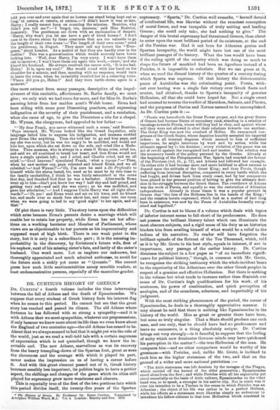DR. CURTIUS'S HISTORY OF GREECE.*
DR. CIIIITIDS' s fourth volume includes the time intervening between the fall of Athens and the death of Epaminondas. We suppose that every student of Greek history feels his interest flag when he comes to this period. He cannot but see that the great story has reached and passed its climax. The old Athens whose fortunes he has followed with so strong a sympathy—and it is with Athens that we must sympathise, whatever our prepossessions, if only because we know more about its life than we even know about the England of two centuries ago—the old Athens has ceased to be. About that we always seemed to feel that it might yet win the rule of the world, just as we read a well-told tale with a certain eagerness of expectation which is not quenched, though we know the in- evitable end. The new Athens, marvellous as was its recovery from the heavy trampling-down of the Spartan foot, great as were the cleverness and the courage with which it played its part, never makes the impression on us of having a career before it. And with this great element passed out of it, Greek history becomes sensibly less important, its politics begin to have a pettier aspect, the shiftings and changes of the game which its cities still played for supremacy grow more wearisome and obscure.
This is especially true of the first of the two portions into which this period divides itself, the twenty-five years of the Spartan
• The History of Greece. By Professor Dr. Ernst Curtin'. Translated by Adolphus William Ward, H.A. Vol. 4. London: Bentley and Bon. 1872. supremacy. "Sparta," Dr. Curtius well remarks, "herself devoid of intellectual life, was likewise without the remotest conception of moral forces, and was incapable of truly uniting and leading Greece ; she could only take, she had nothing to give." The danger of this brutal supremacy had threatened Greece, then about to enter upon the most brilliant period of its existence, at the end of the Persian war. Had it not been for Athenian genius and Spartan incapacity, the world might have lost one of the most brilliant passages of its history. What the loss would have been if the ruling spirit of the country which was doing so much to shape the future of mankind had been an Agesilaus instead of a Pericles, it is impossible to calculate. But we can guess at it, when we read the dismal history of the quarter of a century during which Sparta was supreme. Of that history the dishonourable peace of Antalcidas was the culminating point. Persia, with- out ever having won a single fair victory over Greek fleets and armies, had obtained, thanks to Sparta's incapacity of genuine Hellenism, all that she could have hoped for. Not a single event had occured to reverse the verdict of Marathon, Salamis, and Platesa, and the purposes of Darius and Xerxes seemed to be accomplished. As Dr. Curtius puts it :- "Persia was henceforth the Great Power proper, and the great States of Greece had become States of secondary rank, standing in a relation of vassalage towards Persia, whose will they had to obey, and against whose will they were not allowed to alter their relations towards one another. The Great King was now the overlord of Hellas. He summoned con- gresses of the Greek States, whose deputies humbly accepted his imperial orders ; in all internal disputes which seemed to him of sufficient importance, he might intervene by word and by action, while the ultimate appeal lay to his decision ; every violation of the peace was an act of revolt against the recognised lord and master. This relation was the necessary result of the policy pursued by the Greeks. Already at the beginning of the Peloponnesian War, Sparta had courted the favour of the Persians (vol. iii., p. 72), and Athens had followed her example. On either side it had become more and more habitual to allow success to depend upon the attitude of the Great King ; and thus Persia, though suffering from internal disruption, conquered in every battle which she had fought, and driven back from every coast, had by her conquerors been placed in her present position of having to give the ultimate deci- sion in the struggle between the Greek States. The overthrow of Athens was the work of Persia, and equally so was the restoration of Athenian independence. Already in these times it was a popular proverb in Greece that 'the fate of the Hellenes lies in the hands of the King;' and the relation herein expressed, which had as a matter of fact long been in existence, was now by the Peace of Autalcidas formally recog- nised and legalised."
Dr. Curtius is not to blame if a volume which deals with topics of inferior interest seems to fall short of its predecessors. He does not possess the brilliant literary talent which can illuminate the most obscure subjects, and a rigid sense of his duty as an historian hinders him from availing himself of what would be a relief to the tedium of his narrative. No reader will have forgotten the brilliant episode of the Retreat of the Ten Thousand, which, told as it is by Mr. Grote in his best style, equals in interest, if not in importance, any passage of the earlier history. Dr. Cortina dismisses the subject in a few pages as " of no immediate signifi- cance for political history," though, in common with Mr. Grote, he recognises the striking testimony which the whole incident bears to the superiority of the Athenians over the other Greek peoples in respect of a genuine and effective Hellenism. But there is nothing in the volume but what tends to increase rather than diminish our sense of Dr. Curtius's high qualifications for his work, of his acuteness, his power of combination, and quick perception of analogies, and of the soundness, soberness, and impartiality of his judgment.
With the most striking phenomenon of the period, the career of Epaminondas, he deals in a thoroughly appreciative manner. It may almost be said that there is nothing like Epaminondas in the history of the world. Men as great or greater there have been, but none so truly singular. That a State should produce one such man, and one only, that he should have had no predecessors and leave no successors, is a thing absolutely unique. Dr. Carting brings out very strongly—is it fancifut to suppose that the feeling of unity which now dominates German minds may have quickened his perception in the matter ?—the true Hellenism of the man. He compares him—and no other comparison would be worthy of his greatness—with Pericles, and, unlike Mr. Grote, is inclined to rank him as the higher statesman of the two, and that on the ground of a wider and more national patriotism The Attic statesman was left desolate by the ravages of the Plague, which carried off the kernel of the elder generation ; Epaminondas stood alone from the first ; and while Pericles with all his superiority yet stood essentially on the basis of Attic culture, Epaminondas on the other hand was, so to speak, a stranger in his native city. Nor in truth was it ever his intention to be a Theban in the sense in which Pericles was an Athenian ; the object of his life was rather to be a perfect Hellene, while his efforts as a statesman were likewise simply an endeavour to introduce his fellow-citizens to that true Hellenism which consisted in a force seizing upon and transforming the entire man, without at the same time thereby estranging him from the sphere of popular Hellenic notions. In the very last hour of his life, when he was delighted by the preservation of his shield, be showed himself a genuine Hellen° ; thus, again, it was a genuinely Greek stand-point from which he viewed the war against Sparta and Athens as a competitive contest for the honour of the hegemony in Hellas, an honour which could be justly won only by mental and moral superiority. The conflict was inevitable; it had become a national duty, because the supremacy of Sparta had become a tyranny dishonourable to the Hellenic nation. During the conflict Epaminondas was never false to Hellenic patriotism, and never allowed himself to be guided by the interests of his own city to such a degree as had Themistocles and Pericles. He was exposed to the bitterest cavils on the part of his fellow-countrymen on account of his gentle treatment of Sparta, but he could never bring himself to forget that his adversary was of the same race as himself."
It would not be just to Dr. Carting to pass without mentioning the admirable chapter, the second in this volume, in which he discusses " Athens after her restoration." It is a subject which must be fully dealt with before the lessons of Greek history can be fully learnt. In one way nothing could be more admirable than the use which the Athenian people made of their recovered inde- pendence. No other State was capable of showing so much patriotism, generosity, and moderation. But the personal virtues which, after all, are the foundation of political greatness, had been fearfully weakened. This was not, indeed, all due to Athenian degeneracy. Athena, like New York in the present, was a colluvies gentium. But however caused, the effect remained, and it had its most significant outcome in the deed which so signally falsified the best traditions of Athenian thought, the judicial murder of Socrates.
In conclusion, we must congratulate Mr. Ward on his increased mastery of his own langaage, which he does not now permit to be obscured by his knowledge of German.











































 Previous page
Previous page